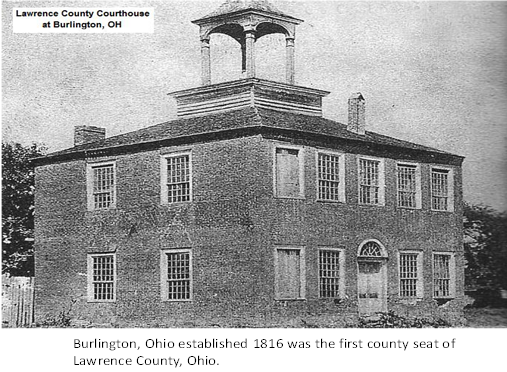LETTER FROM BURLINGTON
Author: JOHN FRITZ
Ironton Register, October 23, 1891
Correspondence of the Register
Lives there a man or child near or far around who has not heard of Burlington, Ohio? The town was once the abode of greatness and the metropolis and the county seat of Lawrence county, Ohio. The place where the “wise men” of the East, Yes of the North, the South, and West, came when the star of hope and prosperity rose in its brilliance and stood over her sacred ground.
Ah, yes; the children unto the third and fourth generations will hear and read of her with pleasure and delight and wonder at her greatness. The child will clamber on the father’s knee and list with an intent ear to the good deeds done and noble acts performed. Yes, you have heard and even seen marks of a great and mighty town. The silent tomb shows great and mighty people in the past.
Still stands the forest primeval overlooking the scenes of past glory. The ever-acting hills stand as mirrors, reflecting the history of bygone days. Mighty cities have sprung up with their churches, halls, and school buildings; empires have fallen, and republics have arisen; the peaceful river, on whose bosom floats the palace and plies the mighty steamer, has widened its borders and changed its course. Thus have all things changed, and with them, our beloved town.
Once the abode of the mighty Probate, now the quiet home of the squire. Once where lawyers learned and wisely expounded law profound and simple, now where “pettifoggers” die on account of morality and goodness.

The old courthouse, where men were made rich by the mistake and misdeeds of others, is now the common school property of the district, where budding characters are developed. Once the judge and the lawyers plead, the teacher imparts instruction and decides on cases of discipline and decorum. Its walls are crumbling, its steeple shaky, and “mother earth” will soon say: “Tis enough, come down lower.”
The old jail, where men whose characters were stained with the crime were kept, is now the home of a private family. The Town Hall is yet retained as such and gives a nice appearance.
But you ask about our town: “Has her glory faded, her business subsided, her interest fled; in a word, is she dead? Nay; look not on her thus. The influence those pioneers had cannot be blotted out. You might as well try to check the cyclone in its mad course or chain still the angry billows of the deep as to try to stop the influence of our forefathers. The royal blood still traverses our veins, and our noble men and women represent the honorable callings in life.
A half-dozen progressive teachers represent the profession of teaching. That of medicine, by one who stood at the head of his class at the noted Miami College and by a lady who has thoroughly mastered the intricacies of the science. The ministers have long since learned of the congenial atmosphere of our town and come yearly and cast their lot with us.
Businessmen carry on the business of this place, and at this time of the year, you may hear the rustle of corn blades on the hillside and dale, the rattle of seed on the ground, and the rumble of apples in the barrel, all of which gives evidence of enterprising farmers.
The young men and women have the same progressive spirit. Messrs. Frank Campbell and Edgar Wilson are attending Miami Medical college, and Millie Soupene is taking music lessons at Gallipolis.
An efficient corps of teachers conduct the schools as follows: Miss Ethel Williams, Primary. Miss Lulu Moore, intermediate, and W. D. Sydenstricker, advanced.
Time and space will not permit further detail. From time to time I will write you the passing events of the town.
JOHN FRITZ

0 Comments